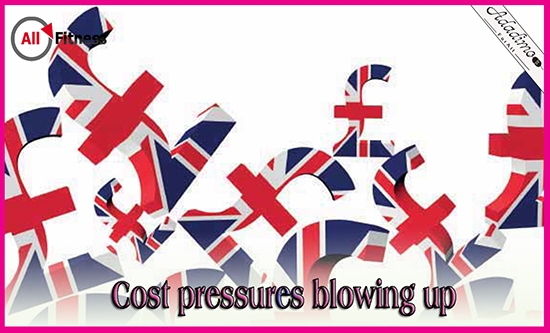Cost pressures blowing up
Cost pressures blowing up
When we think we’ve overcome one challenge, it feels
like another is thrown our way.
We’re just now starting to get back to normality when it comes to the Covid pandemic, but this year has thrown up a number of other challenges when it comes to costs.
Energy prices are up, fuel prices are up, and inflation is at levels we’ve not experienced since the 1980s.
Inflation expectation, in particular, has hit record highs.
Conducted between 23 August and 13 September,the British Chambers of Commerce (BCC) Quarterly Economic Survey – the UK’s largest independent survey of business sentiment, involving 5,737 businesses, and a leading indicator of UK GDP growth – has shown that while businesses continue to recover from the deepest recession on record, persistent weakness in
several indicators highlight concerns over the strength of the recovery.
For example, 62% of industrial firm respondents are planning price hikes over the next three months.
The latest data from the Office for National Statistics shows that the cost of living inflation had risen from 2% to 3.2% in August alone, with the Bank of England expecting that figure to rise to more than 4% by the end of the year.
Shevaun Haviland, BCC director-general, said: “The
supply chain crisis, alongside wider labour shortages
and spiralling price rises, is clearly starting to drag on
our economic recovery from Covid. Businesses are being
battered by a deluge of upfront cost pressures, including
huge increases in the prices of key raw materials
and shipping, as well as now facing a rise in National
Insurance contributions. At the same time, they are
losing out on opportunities for growth due to the labour
shortages, despite many already raising wages and
offering training.”
Colin Porter, managing director at Porters Bodyshop
in Northern Ireland, said: “Like all other businesses in
our sector – and beyond – we are seeing increasing
costs from energy bills to the general buying of our
materials. There is no doubt that this will have an effect
on our bottom line, however we all can look at ways of
managing these costs without major increases in repair
costs to our customers and while still maintaining high
quality repairs at all times.
“We are actively looking at our energy consumption
within the business and we watch closely the use of wet
and dry materials. We do this by looking at our average
paint mix per job report and the cost of materials per
sold hour. These are just some of the ways we manage
our main costs to the business; by reviewing these
reports closely it lets us see how we are performing
and opens up ways of improving things. However, costs
are still going up therefore it’s down to all of us to start
thinking slightly differently about how we manage our
businesses into the future.”
Ashley Bernstein, managing director of Merseyside
Car Hospital, added: “As we slowly come out of the
Covid pandemic, we are now experiencing shortages and
a significant shortage of a large number of vehicle parts,
equipment and courtesy vehicles. As we are all aware,
there has been a dramatic increase in energy bills, as
well as general business expenses, and as a company
we have been affected by this increase in costs. That
said, we have been pro-active in ensuring that we are
looking at every aspect of our business, from ensuring
that all lights are switched off in areas not being utilised
and making sure there is no wastage across heating and
other utilities. We have always and continue to monitor
all products being used to ensure there’s no waste. Price
increases are out of control, however tightly monitoring
our operating costs helps to soften the blow of these
dramatic increases.”
MG Cannon’s Robert Snook is finding the positives
in the situation viewing it as an opportunity to look at
everything in your business and improve efficiency allround.
He said: “Bodyshops facing price increases find
it hard to directly pass on these increases due to fixed
rate contracts being in place. However, there are things
that can be done to mitigate their impact. No matter
where you are with your suppliers right now, you will
still be able to buy differently and/or buy better and/
or buy less, without doing less work or reducing your
business sales and often without it being bad news for
your suppliers either.
“Look at each supplier, supply process, and product
line through a new lens – when was the last review
with that supplier, when did you last benchmark that
product, price or service, how can you involve the
supplier in your new objectives and what structure do
you need to manage purchasing better from now on?
You will often be surprised by the results and wonder
why you didn’t look at these things before. Body shops
often try and offset increases by only focusing on
doing more or selling more, but there are often unseen
savings opportunities from buying better – innovations
in these areas come out of challenging times like
these, so this is your best opportunity to take a fresh
look at these things.”
The BCC’s Havilland concluded by saying: “The focus
Must now be on creating the best possible environment
For businesses to grow and thrive. By supporting firms
Through the difficult months ahead, they can begin to
Generate wealth, create jobs and support communities.
That is by far the best way to sustainably deliver the
Tax revenue the government needs to support public
Services and the wider economy.”
source: Bodyshop By By Danielle Bagnal












No comments